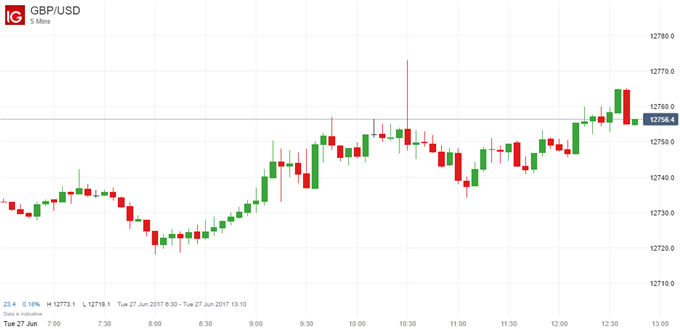Talking Points
-The Bank of England confirmed Tuesday that it is overseeing contingency planning to mitigate risks to financial stability as the UK withdraws from the EU.
-There are potential risks to financial stability associated with the range of possible outcomes and a number of paths to them under Brexit, Carney says.
- Check out the DailyFX Economic Calendar and see what live coverage of key event risk impacting FX markets is scheduled for the week on the DailyFX Webinar Calendar.
The Bank of England confirmed Tuesday that it is overseeing contingency planning to mitigate risks to financial stability as the United Kingdom withdraws from the European Union. In a section of its latest Financial Stability Report on Brexit, the central bank says there are a range of possible outcomes for, and paths to, the UK’s withdrawal.
Its Financial Policy Committee, or FPC, “will oversee contingency planning to mitigate risks to financial stability as the withdrawal process evolves,” the bank says. “Irrespective of the particular form of the United Kingdom’s future relationship with the European Union, and consistent with its statutory responsibility, the FPC will remain committed to the implementation of robust prudential standards in the UK financial system.
This will require a level of resilience to be maintained that is at least as great as that currently planned, which itself exceeds that required by international baseline standards, the bank argues. “The United Kingdom’s position as the leading internationally active financial center, with a financial center that is, by asset size, around ten times GDP, means that the FPC’s statutory responsibility of protecting and enhancing the resilience of the UK financial system is particularly important for both the domestic and global economies,” it says.
“Absent consistent implementation of standards internationally and appropriate supervisory co-operation, the FPC would need to assess how best to protect the resilience of the UK financial system.”
Separately, the FPC raised its counter-cyclical capital buffer (CCyB), which rises and falls with the ups and downs of the economy, to 0.5% from zero and said it expects to raise it further to a “normal” 1.0% in November. In the markets this was seen as a nod towards tighter monetary policy, lifting the British Pound modestly.
Chart: GBP/USD Five-Minute Timeframe (European trading hours June 27)

The same themes were taken up by Bank of England Governor Mark Carney at his press conference after the report was released. There are “potential risks to financial stability associated with the range of possible outcomes and a number of paths to them under Brexit,” he said in his opening remarks.
“In addition the inconsistency between the valuation of some assets, such as commercial real estate and corporate bonds, and the risks implied by very low long-term interest rates make those assets vulnerable to a re-pricing whether through an increase in long-term interest rates, adjustments to growth expectations, or both.”
The FPC, he confirmed, will continue to identify and monitor the UK financial stability risks associated with Brexit, so that the necessary actions can be taken to mitigate them. “In particular, the FPC will oversee contingency planning in order to help promote an orderly adjustment to the new relationship between the UK and the EU,” Carney said. “There are a range of possible outcomes for the UK’s future relationship with the EU and a number of possible paths to that relationship. Consistent with its remit, the FPC is focused on scenarios that, however unlikely, could have the most impact on UK financial stability.”
This includes a scenario in which there is no agreement in place at the point at which the UK leaves the EU. Such scenarios are where contingency planning and preparation will be most valuable. Without such plans, financial stability could be affected directly by impacts on the provision of financial services, and indirectly, through macroeconomic shocks, Carney said.
--- Written by Martin Essex, Analyst and Editor
To contact Martin, email him at martin.essex@ig.com
Follow Martin on Twitter @MartinSEssex
If you’re looking for trading ideas, check out our Trading Guides; they’re free and updated for the second quarter of 2017
If you’re looking for ideas more short-term in nature, check out the IG Client Sentiment Data




